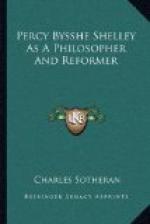“Earth groans beneath
religion’s iron age,
And priests dare babble
of a God of Peace—
Even whilst their hands
are red with guiltless blood,
Murdering the while,
uprooting every germ
Of truth, exterminating,
spoiling all,
Making the earth a slaughter-house.”
[Footnote C: I refer to the abominable outrages perpetrated a few months ago at San Miguel, Panama, where popular preachers were forced by the ecclesiastical powers to foment rebellion by violently denouncing the State authorities, who had refused to allow a pastoral of the Christian Bishop of San Salvador, hostile to the laws, to be read in the churches. Having been put into a state of frenzy by one Palacios, a canon of the cathedral, a fanatic mob revolted, liberated prisoners, murdered generals in command, massacred numbers of the best citizens, set fire to the city with kerosene, and destroyed over one million dollars’ worth of property. After this theological revolt had been put down, passports, couched in the following terms, and sealed with the seal of the bishopric, were found on the bodies of some of these holy murderers;
“PETER.—Open to the bearer the gates of heaven, who has died for religion.
(Signed), GEORGE, Bishop of San Salvador.”
Similar attempts were made by the Christian hierarchy in Brazil against the Masonic body; but, fortunately, the emperor, a liberal and an enlightened savant, crushed the attempt under foot, and unmistakably proved, to the satisfaction of humanity, that he was not to be transformed into a nineteenth century Charles the Ninth or Philip the Second, and act the cat’s paw for Pio Nono, ex-carbonari and recusant mason, to wreak his vengeance on the brethren whom he had betrayed.]
To those who will look down the ages, I would ask, is this picture overdrawn? and further, to remember that in Shelley’s own words:
“Eleven millions of men, women and children have been killed in battle, butchered in their sleep, burned to death at public festivals of sacrifice, poisoned, tortured, assassinated and pillaged in the spirit of the religion of peace, and for the glory of the most merciful God.”
Is it amazing that he should have written such a “highly wrought and admirably sustained” tragedy as the “Cenci,” founded on facts, and which has been deemed by competent critics the first since Shakspeare—that he should have brought forward, with vivid delineation, the crimes of the priesthood—and that he should have made us remember the terrors of the bloody wars on heretics and heathen, in words such as these:
“Yes! I have seen
God’s worshippers unsheathe
The sword of His revenge,
when grace descended,
Confirming all unnatural
impulses,
To sanctify their desolating
deeds;
And frantic priests
wave the ill-omen’d cross
O’er the unhappy
earth; then shone the sun




